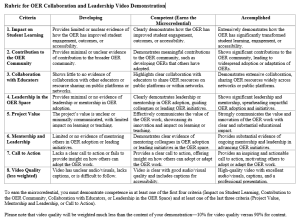Chapter 5 – Advancing
In this chapter, you will demonstrate your ability to advance Open Educational Resources (OER) through collaboration, mentorship, and leadership. This is your opportunity to showcase how your OER work, initiatives, or knowledge has made a significant impact in one or more of the following areas: how your OER has enhanced student learning, how you have contributed to the broader OER community, how you have collaborated with educators to share your resources on public platforms, and/or how you have demonstrated leadership in the OER space through OER adoption, mentoring colleagues on using OERs, or leading OER initiatives.
This chapter aims to assess your competence in advancing the use of OERs for collaboration and transformation within your academic or professional sphere. You will create a video demonstrating your OER work, highlighting your innovative impact on learning and your leadership and mentorship role in guiding colleagues toward OER adoption.
Through this activity, we aim to see how you position yourself as a leader in OER, contributing meaningfully to the community while driving forward the use of open educational practices.
Activity: OER Collaboration and Leadership Video Demonstration
Objective: To assess your competence in advancing OERs through collaboration, mentoring, and leadership by showcasing your OER project in a video format.
Instructions for the Video Submission:
- Create the Video Demonstration:
- Record a 3-5 minute video that demonstrates your OER work.
- In your video, showcase how your OER work, initiatives, or knowledge has made a significant impact in one or more of the following areas:
- Enhanced student learning: How has your OER improved student engagement, outcomes, or accessibility?
- Contribution to the broader OER community: What have you done to support the growth and sustainability of the OER community, such as developing resources that others have adopted or adapted?
- Collaboration with educators: How have you collaborated with others to share your resources on public platforms or within your network?
- Demonstrated leadership in the OER space: Have you led OER adoption efforts, mentored colleagues in using OERs, or spearheaded OER initiatives in your institution or field?
- Ensure the video communicates at least one of the following:
- Project value: How does your OER project improve learning or teaching? What makes it innovative?
- Mentorship and leadership: Explain your role in mentoring others in OER adoption or leading initiatives within your institution or community.
- Call to action: Provide insight on how others can adopt or adapt your project in their own context.
- Quality considerations:
- Make sure the video has clear audio and visuals.
- Include closed captions to ensure accessibility for all viewers.
- Submit the Video:
- You may submit the video either as a link (if uploaded to a video hosting platform like YouTube or Yuja) or as a file upload.
- Supported file types for upload include:
- MP4, MOV, WMV, AVI.
- Maximum file size: 1GB.
- For larger files, you are encouraged to upload the video to a hosting platform and provide a link.
Submission Checklist:
- Video Length: 3-5 minutes.
- File Format: MP4, MOV, WMV, AVI.
- File Size: Maximum of 1GB (If larger, submit a link).
- Content:
- Clear demonstration of your OER project and its impact.
- Quality audio, video, and captions for accessibility.
- Video Submission: Either as a direct file upload or a link to a hosted video.
Evaluation Criteria:
To earn the microcredential, you must demonstrate competence in at least one of the first four criteria (Impact on Student Learning, Contribution to the OER Community, Collaboration with Educators, or Leadership in the OER Space) and at least one of the last three criteria (Project Value, Mentorship and Leadership, or Call to Action).
Please note that video quality will be weighted much less than the content of your demonstration—10% for video quality versus 90% for content. Refer to the rubric that will be used in assessing your video submission.


